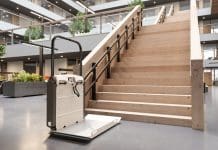Accessible services and premises need to be recognised as good for business, says Ian Streets of About Access
Whether they are defiant or just in the dark, many businesses still duck their responsibilities when it comes to making their premises and services accessible to disabled people.
In doing so they are also missing the opportunity of expanding their customer base, because if someone can’t physically get into your shop or restaurant or use your service, they’ll take their business elsewhere.
Advances in technology on a number of fronts mean that society is better equipped to meet the requirements of disabled people.
There are still not enough induction loops in place for people with impaired hearing, but there are many more than there used to be. Accessible loos are more widely available and better designed – and they’re called accessible loos rather than disabled toilets! Changing places are now more common, providing extra facilities to help accommodate people with complex needs.
Recently we were called in to comment on the accessibility of trains for the new HS2, looking at the height and the gap between the carriage doors and the platform. The mock-up enabled us to adjust the distances as people stepped on and off the train.
Such advances have come from adopting the process of user-testing, but if you ignore them and you fail to make your business accessible then you are likely to experience a different kind of testing by users.
In the modern age, disgruntled customers are more likely to take to social media to share their experiences and embarrass your business, and some will follow that with legal action.
It is all about good business sense – talk to your customers and be aware of the guidance that is available. The BS8300 code of practice is just one of many documents which covers the design of buildings and their approaches to meeting the needs of disabled people. It is currently being reviewed in preparation for a new version, and will first go out for public consultation.
The latest report from The Papworth Trust, published earlier this year, says that 19% of people in the UK have a disability, and in many cases it is not immediately visible or obvious. The most common impairments are mobility, at 57%, followed by stamina, breathing or fatigue at 38%. Dexterity impairments accounted for 28% and mental health was 16%. That’s more than 100%, because some people have more than one impairment.
The Trust also reported that 29% of adults with impairments had found some buildings outside of their home to be inaccessible, with 53% of people experiencing difficulties with shops, 23% with bars or restaurants and 17% with theatres or cinemas.
The most common problem, experienced by 44% of people with impairments, was with moving around buildings where stairs, doors or narrow corridors restricted access. Inadequate lifts or escalators presented barriers to 23% of people and 22% experienced difficulty with approach areas because of a lack of ramps or handrails. Parking was a problem for 21%.
The Trust also found that disabled customers spend a lot longer choosing where to buy than the average consumer, and they tend to make more informed choices.
The main reasons for disabled customers switching to a more accessible competitor include inaccessible premises, inaccessible websites, phone systems or printed material and poor customer service, such as lack of awareness, poor communication and lack of flexibility.
They make their decisions based on a business reputation for good service and on their own experience. If you provide it you’ll get their custom and their loyalty.
Many thanks for reading this. If you liked it please feel free to share it. Constructive comments are always welcome and if you have questions on the subject matter you can connect with me on LinkedIn and send me a message, or else you’ll find my contact details on my LinkedIn profile.
If you need help improving the accessibility of your organisation or to do more by improving your skills, then please get in touch and check out the About Access website.
Ian Streets
About Access Ltd
01482 651101
info@aboutaccess.co.uk
www.aboutaccess.co.uk













